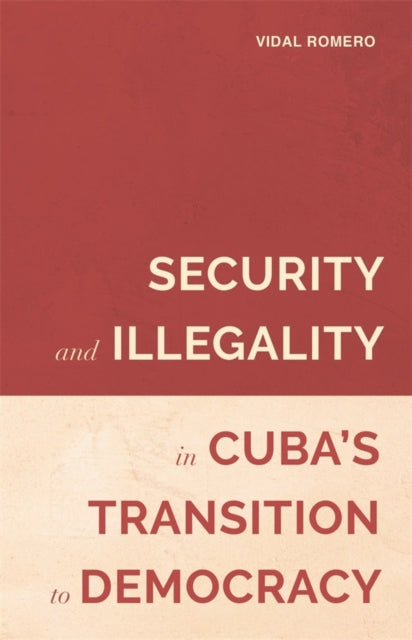Dr Vidal Romero
Security and Illegality in Cuba's Transition to Democracy
Security and Illegality in Cuba's Transition to Democracy
YOU SAVE £0.36
- Condition: Brand new
- UK Delivery times: Usually arrives within 2 - 3 working days
- UK Shipping: Fee starts at £2.39. Subject to product weight & dimension
Bulk ordering. Want 15 or more copies? Get a personalised quote and bigger discounts. Learn more about bulk orders.
Couldn't load pickup availability
- More about Security and Illegality in Cuba's Transition to Democracy
This book examines present security conditions in Cuba and forecasts the effects that economic and social liberalization could have on levels of criminality. It argues that Cuba's privileged geographical location, combined with economic scarcity, the remnants of the communist system, and local criminal organizations, makes it vulnerable to more dangerous foreign criminal groups.
Format: Hardback
Length: 174 pages
Publication date: 18 June 2021
Publisher: Boydell & Brewer Ltd
This book examines present security conditions in Cuba and forecasts the effects that economic and social liberalization could have on levels of criminality. For decades, Cuban citizens have enjoyed relatively good security, as a consequence of surveillance and tight political control by an authoritarian state. However, economic liberalization necessitated by the loss of Soviet support has resulted in illicit activities and increased criminality, including drugs, contraband, and human trafficking. Today, relatively good security and a stable political system coexist with widespread illegality. But as restrictions are eased, the average citizen is becoming less secure. Cuba's privileged geographical location, combined with economic scarcity, the remnants of the communist system, and the local criminal organizations it created, also makes it vulnerable to more dangerous foreign criminal groups. Based on both quantitative and qualitative data, including in-depth interviews with experts on Cuba and democratization, and observational research in Cuba itself, the book seeks to identify the risks associated with liberalization and to explore workable solutions. More broadly, it aims to shed light on how the negative consequences of social and economic liberalization can be minimized for the average citizen during periods of political transition from authoritarian systems.
Cuba's security situation is complex and multifaceted, influenced by a range of political, economic, and social factors. The country has enjoyed a relatively stable political system for several decades, with a single-party government that has been in power since the Cuban Revolution of 1959. However, economic challenges, including the loss of Soviet support and the subsequent economic embargo imposed by the United States, have led to widespread poverty and inequality in Cuba. This has created a fertile ground for criminal activity, including drug trafficking, contraband, and human trafficking.
One of the main challenges facing Cuba's security is the country's privileged geographical location. Cuba sits on the Gulf of Mexico, making it a strategic location for drug trafficking and other illicit activities. The country's close proximity to the United States also makes it vulnerable to foreign criminal groups, who may seek to exploit Cuba's vulnerabilities for their own gain. Another factor contributing to Cuba's security challenges is the remnants of the communist system that remained in place after the Cuban Revolution. The Cuban government has maintained tight control over its citizens' lives, including limiting freedom of speech and assembly. This has created a sense of frustration and resentment among some Cubans, who may turn to criminal activity as a way to express their grievances.
In addition to these internal factors, Cuba's security is also vulnerable to external factors, such as climate change and natural disasters. Climate change has the potential to exacerbate water scarcity and food insecurity in Cuba, which could lead to increased competition over resources and increased criminal activity. Natural disasters, such as hurricanes and floods, can also disrupt the country's infrastructure and economy, leading to increased crime and social unrest.
To address these security challenges, Cuba has implemented a range of measures, including increased surveillance and police presence, crackdowns on criminal activity, and economic reforms. However, these measures have not been without their challenges. For example, increased surveillance and police presence may lead to increased tensions between the government and its citizens, while crackdowns on criminal activity may lead to the displacement of vulnerable populations and increased human rights abuses.
In conclusion, Cuba's security situation is complex and multifaceted, influenced by a range of political, economic, and social factors. While the country has enjoyed a relatively stable political system for several decades, economic challenges, including poverty and inequality, have created a fertile ground for criminal activity. Cuba's privileged geographical location, the remnants of the communist system, and external factors such as climate change and natural disasters also contribute to the country's security challenges. To address these challenges, Cuba needs to implement a comprehensive and sustainable approach that balances economic development with social and human rights. This may include measures such as increasing access to education and job training, promoting social inclusion and equity, and investing in infrastructure and technology to mitigate the effects of climate change.
Weight: 384g
Dimension: 162 x 241 x 15 (mm)
ISBN-13: 9781855663527
This item can be found in:
UK and International shipping information
UK and International shipping information
UK Delivery and returns information:
- Delivery within 2 - 3 days when ordering in the UK.
- Shipping fee for UK customers from £2.39. Fully tracked shipping service available.
- Returns policy: Return within 30 days of receipt for full refund.
International deliveries:
Shulph Ink now ships to Australia, Belgium, Canada, France, Germany, Ireland, Italy, India, Luxembourg Saudi Arabia, Singapore, Spain, Netherlands, New Zealand, United Arab Emirates, United States of America.
- Delivery times: within 5 - 10 days for international orders.
- Shipping fee: charges vary for overseas orders. Only tracked services are available for most international orders. Some countries have untracked shipping options.
- Customs charges: If ordering to addresses outside the United Kingdom, you may or may not incur additional customs and duties fees during local delivery.


